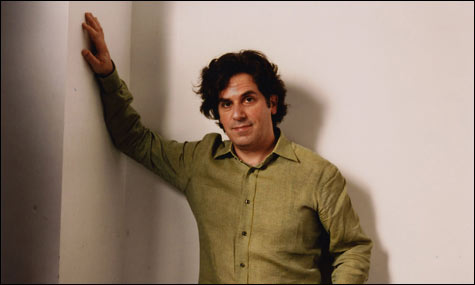
ROCK ON: When you’re burnt on Brooklyn, you can take a break in LA. |
For his rock-and-roll novel You Don’t Love Me Yet, Brooklyn author Jonathan Lethem went west. No, not to Staten Island. Think farther. A lot farther. Los Angeles.
It was a healthy decision for Lethem, whose previous two novels, Motherless Brooklyn and the semi-autobiographical Fortress of Solitude, paid ample, obsessive tribute to the borough. The latter — spanning three decades in 528 pages — apparently took its toll on the author. In a Globe interview earlier this month he said, “By taking on the freight of my own and other people’s stories — a kind of collective cultural memory — I incurred a degree of responsibility.”
Los Angeles evidently offered an opportunity to get out from under the looming eyes of Dean Street. There he could do something nobody would see coming. Write a comedy, for instance.
You Don’t Love Me Yet takes aim at Lucinda Hoekke and the band she plays bass in: singer and ex-boyfriend Matthew, lead guitarist Bedwin, drummer Denise. The foursome spend almost as much time quarreling over what they should call themselves — Robot Head in Mourning? Idiot Teeth? — as they do performing. Their entire catalogue is authored by fragile genius Bedwin, who for all his songwriting ability can barely feed himself. Worse, he’s begun to experience writer’s block: “My problem is I don’t believe in the place where the sentences come from anymore.”
The band members work a variety of day jobs: porn shop, zoo, and, in Lucinda’s case, a complaint call center that also serves as an art installation. Here she begins a phone relationship with a professional sloganeer, Carl, a/k/a “the complainer.” Impressed by his ability to turn a phrase, she meets up with him in person and the two engage in a series of exhausting sexcapades.
But as you’d guess from his previous work, Lethem is after more than laughs. He has an essay in the February Harper’s about copyright and plagiarism in the arts, and he continues that theme here. With Bedwin blocked, Lucinda steals Carl’s ideas for lyrics. Five new songs are born out of the theft; one, “Monster Eyes,” becomes a local hit.
The discovery of Lucinda’s “crime” sends the rest of the band into a frenzy, with the result that Carl is absorbed into the line-up. More absurd is the post-band-break-up meeting between Carl and Bedwin concerning the fate of the songs. After much typical hemming and hawing by Bedwin, the ever-reasonable Carl suggests: “Or we could split them down the middle, lyrics and music. Take out what we came in with, right?”
Meanwhile, Lucinda, having scattered her clothes around the apartment, has been hiding — nude and silent — in the bedroom, waiting for Carl. Despite her role as “the band’s invisible betrayer and its invisible angel at once,” without whom “Monster Eyes” might never have been written, she’s left out of the discussion. In a further humiliation, the men sweep up and discard her clothing; she returns home wearing nothing but drawing paper from an enormous pad that’s lying around. Such is the price of appropriation in Lethem’s world.
What Lethem is ultimately saying about authorship (originality is overrated?), or even the Los Angeles rock scene, remains vague. The book works best as a romantic comedy set among wittily drawn rock-and-roll types. Amusing, but not Brooklyn.
JONATHAN LETHEM | Coolidge Corner Theatre, 290 Harvard St, Brookline | March 27, 6 pm | $2 | 617.566.6660